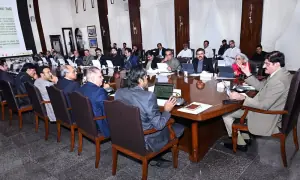National Assembly passes tax-heavy budget ahead of IMF loan
4 min readThe National Assembly passed the annual budget for the Fiscal Year 2024-25 on Friday as the South Asian country looks forward to talks with the International Monetary Fund for a new programme to strengthen the economy.
Pakistan’s parliament moved to pass the government’s tax-heavy finance bill on Friday for the coming fiscal year even as annual inflation was projected to rise to as much as 13.5% for June.
The bill comes ahead of more talks with the IMF for a loan of $6 billion to $8 billion to avert a debt default for Pakistan, the slowest-growing economy in South Asia.
As the parliament moved to pass the bill clause by clause, Pakistan’s sovereign dollar bonds slid on Friday, Tradeweb data showed, with the 2031 maturity shedding 1.4 cents to trade at 78.69 cents on the dollar.
Finance Minister Muhammad Aurangzeb moved the finance bill in parliament, which was opened to seek amendments and debate by the ruling alliance led by Prime Minster Shehbaz Sharif and its opposition. Speaker Sardar Ayaz Sadiq announced the move in a live TV telecast.
The government has decided a duty rate on the excisable items, including allotment or transfer of commercial property, for the taxpayers and non-taxpayers. Airfares for international flights are also expected to increase in Pakistan from July 1 as the federal government has proposed taxes on them to generate revenue.
The government presented the national budget on June 12 with a challenging tax revenue target of Rs13 trillion ($46.66 billion) for the year starting July 1, up about 40% from the current year, to strengthen the case for a new rescue deal with the IMF.
The budget is gearing the country towards an era of sustainable and inclusive growth, said a finance ministry report issued on Friday, which projected annual consumer price inflation for June 2024 between 12.5% to 13.5%, up from 11.8% in May.
“The government was implementing various administrative, policy and relief measures to control inflationary pressures,” the report said.
The rise in the tax target is made up of a 48% increase in direct taxes and a 35% hike in indirect taxes over revised estimates of the current year. Non-tax revenue, including petroleum levies, is seen increasing by 64%.
The tax would increase to 18% on textile and leather products as well as mobile phones besides a hike in the tax on capital gains from real estate.
Workers will also get hit with more direct tax on income.
Opposition parties, mainly parliamentarians backed by the jailed former prime minister Imran Khan, have rejected the budget, saying it will be highly inflationary.
Pakistan has projected a sharp drop in its fiscal deficit for the new financial year to 5.9% of gross domestic product (GDP), from an upwardly revised estimate of 7.4% for the current year.
The State Bank of Pakistan has also warned of possible inflationary effects from the budget, saying limited progress in structural reforms to broaden the tax base meant increased revenue must come from hiking taxes.
The upcoming year’s growth target has been set at 3.6% with inflation projected at 12%.
The South Asian nation has initiated discussions with IMF for a new multi-billion dollar loan agreement – its 24th bailout in more than six decades – to support its economic reform programme.
While around 40 per cent of the population already lives below the poverty line, the World Bank said in April it feared that 10 million additional Pakistanis would fall below this threshold.
“Existing taxpayers face new tax measures while the undertaxed remain unburdened,” Ali Hasanain, associate professor of economics at the Lahore University of Management Sciences said to AFP.
The austerity policies “will accelerate the exodus of highly skilled workers,” said Hasanain.
Opposition parties have rejected the budget, stating it would be highly inflationary.
Leader of the Opposition in the National Assembly Omar Ayub said that his party rejected the “anti-industry and anti-people budget”.
While describing the budget as “economic terrorism” against the people, the PTI leader said the treasury benches were “the killers of the masses”, who are unaware of the economic realities.
“Inflation will increase due to this budget. There will be no economic growth with this budget,” the parliamentarian said, noting that electricity prices will increase from Rs70 to Rs85.
Also, read this
PTI Chairman Barrister Gohar Khan said there was no austerity plan in the budget and claimed that a huge amount of people have become unemployed during the incumbent government’s tenure.
“KP is being targeted because its people have voted for Tehreek-e-Insaaf,” he added.
JUI-F lawmaker Aliya Kamran said that the budget has several “defects” and that imposing a duty on medical devices would make the life of the poor more difficult.
For the latest news, follow us on Twitter @Aaj_Urdu. We are also on Facebook, Instagram and YouTube.


























Comments are closed on this story.